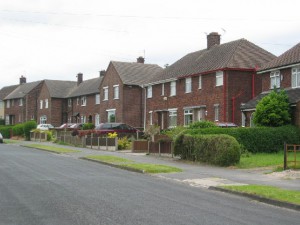Banking on crisis
Article published: Thursday, July 14th 2011
The austerity of the last year has thrown the UK’s housing crisis into sharp relief, with a leaked memo from communities minister Eric Pickles warning how housing benefit cuts may see 40,000 families lose their homes. Yet this crisis stretches far beyond the current government, with 22,723 households in Manchester alone trapped on the city’s waiting lists in 2009, and solving it is not on the political agenda. Lisa Ansell explains.
 Charities have been out in force about the effect austerity measures are having on the housing crisis. The results of the Fawcett Society’s research with the Institute of Fiscal Studies, revealing how the heaviest burdens will fall on predominantly female lone parent households, were overshadowed by the sheer enormity of the impact of housing benefit changes.
Charities have been out in force about the effect austerity measures are having on the housing crisis. The results of the Fawcett Society’s research with the Institute of Fiscal Studies, revealing how the heaviest burdens will fall on predominantly female lone parent households, were overshadowed by the sheer enormity of the impact of housing benefit changes.
Shelter and Crisis have warned that the ‘safety net’ has been dismantled, with concern for the affected ‘middle classes’ making headlines, and local authorities are already feeling the increased pressure of rising homelessness. It is no secret that a housing crisis has been developing for years, and finding new ways to describe the way property prices have inflated, wages have stagnated, and how welfare spending and credit bridged the difference, is getting tricky. There are few innovative ways left to say that our council housing stocks were sold off, or to describe how the resulting shortage helped fuel a property boom on which the entire economy depended.
It is difficult to find people unaffected. Britain has a generation for whom a secure home of their own, rented or bought, is a dream to aspire to. People earning good money are lying awake at night, worrying about the inevitable end of artificially suppressed interest rates. Families up and down the country excluded from our still inflated property market, with little credit available to access it, are at the mercy of an insecure private rental market.
All in it together
Such rent and childcare costs are so high that families up the income scale are reliant on housing benefit to continue working and stay in their homes. Families who have never considered themselves “welfare dependent” are relying on tax credits to meet exorbitant mortgages. Our housing crisis has spread right across the social spectrum and if it isn’t affecting you, it affects your kids. Your friends. Whether you buy, rent, work in the public or private sector. Whether you are “squeezed middle”, that mythical working class, or the feared “excluded poor”.
Until the election, the biggest question was why politicians and the political media were ignoring it. Local authorities had warned of the rising housing benefit bill for years. Britain’s UK household debt relative to GDP more than doubled in eight years, it has exceeded our GDP since 2007, and yet our political parties do not mention it. Rising house prices are still treated as a sign of economic recovery, while charities and organisations at the coal face of debt and housing (where political sound bites don’t become true through repetition) have long issued stark warnings of the cost of a perfect storm brewing.
Then the election came, and our political parties did show they were aware of the problem. They just had no intention of tackling it.
Mortgaging the future
Both main political parties adopted the mantra that housing benefit is an affront to, in the words of the Ed Miliband-authored 2010 Labour manifesto, “ordinary hard working families”, and tackling ‘scroungers’ was touted as tackling the housing and debt crisis. Tax credits have been cut and capped, with no reference by any party to the low wages they disguised by subsidising employers.
The natural results of spending cuts on this scale is to pass the debt the state took on to rescue financial markets back again to households, so that the private debt they will rely on to cover their falling living standards may service afresh the enormous debt bubble on which our economy relies.
These measures not only ignore the enormity of the housing crisis, but make it much worse. Nevertheless, our political elite and a media drawn from the same narrow club were easily able to ensure the only debate around this issue was confined to party-political tribalism and the use of stereotypes lifted straight from The Sun to paint the crisis as the moral failings of a few of those affected.
The reality of how austerity measures are impacting on our housing crisis raises a new question. When did our political system and the media it feeds become so corrupt and separate from the country it serves that a housing crisis affecting so many people could be lost under sound bites about scroungers and “necessary cuts”, while policies that stick a grenade under it are accepted as sensible?
More: Opinion
Comments
-
This is largely a non-story.
Even if families do lose their homes they will be rehoused by the taxpayers and someone else will get to live in their old home.
The net result is simply that some people move to less desirable homes and some people move to nicer ones because they can aford the rent.
Comment by simon on July 16, 2011 at 1:11 pm -
Your ignorance is astounding Simon, the passing on of the Billions of pounds of increased debt garnered by bailing out the bankers on the middle classes is the biggest crime of the century and its being repeated right across Europe and the USA a non story indeed! you TWAT!
Comment by Mick Reilly on October 22, 2012 at 9:03 pm
The comments are closed.



